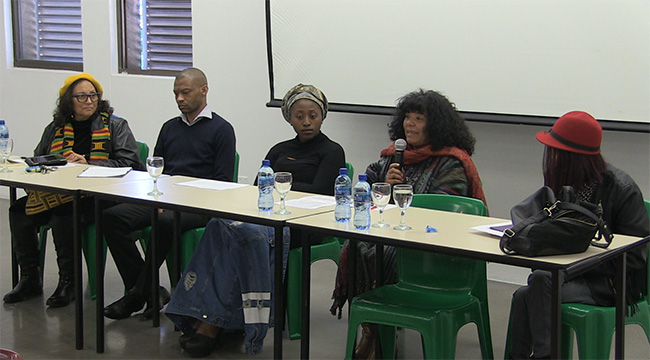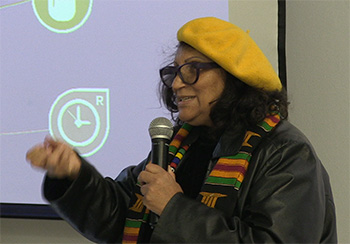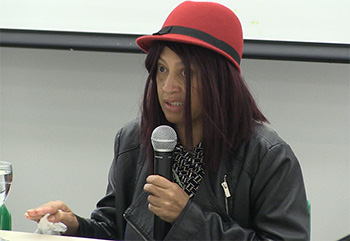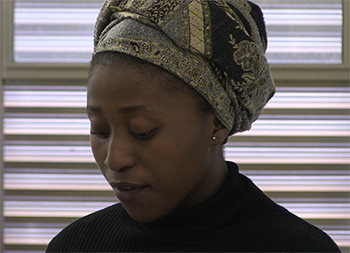CAS hosts public discussion with Cape Town Museum on the legacy of O.R. Tambo

A panel of four prominent speakers engaged in-depth and critically on the legacy of O.R. Tambo at the Centre for African Studies and pushed the audience into thinking in novel ways conceptually about ‘legacies’.
The conversation coincided with both Youth Month and the commemoration of the founding of the Freedom Charter on 26 June 1955. The panellists responded to an audio clip of Oliver Tambo broadcast on 1 November 1983 on Radio Freedom to commemorate the founding of the South African Women’s Federation in 1984 as: ‘South Africa’s Year of the Women’. Radio was at the time of the transmission crucial to the anti-apartheid and de-colonial struggles in Africa.

The O.R. Tambo Event panelists: Professor Gertrude Fester (Sol Plaatje University); Dr Bongani Ndhlovu (Cape Town and Iziko Museums); Motlalepula Cathy Phukubje (#RMF and African Studies); Dr June Bam-Hutchison (Panel Chair & African Studies); Valdi van Reenen (The >Trauma Centre for Survivors of Violence & Torture)
Panellists included anti-apartheid struggle veteran and former Gender Commissioner, Professor Gertrude Fester of Sol Plaatje University; Valdi Van Reenen, Executive Director of The Trauma Centre for Survivors of Violence and Torture; Dr Bongani Ndhlovu, member of the Cape Town Museum management committee and Executive Director of Collections, Iziko Museums; and #RMF activist African Studies student Motlalepula Cathy Phukubje.
The meeting was chaired by Dr June Bam-Hutchison of African Studies (also chair of the Cape Town Museum). In her response to ‘Are we fulfilling the expectations of the struggle for freedom?’, Professor Fester offered a sobering scrutiny drawing on feminism, unity and intersectionality; that the older generation of activists failed to confront sexual harassment and patriarchy within the political organisations and liberation movement of the 1980s at large (UDF, MDM etc.) She critiqued the complacency within the Women’s League and highlighted the irony that South Africa has the second largest representation of women in parliament in Africa (Rwanda has the highest).

|
Fester urged that we need to promote strategic representation of women as opposed to tokenism and there have to be more intergenerational ‘listening’ amongst activists to draw lessons from the past failings. Focusing on the ‘invisibility of violence’, Van Reenen started with her own story of her current battle with terminal cancer and the deprivation of rights of poor women to indigenous health practises; women are not only subjected to health discriminatory practises but are also represented in the media as ‘neglecting’ their children, leaving them vulnerable to violence, rape and murder – as if men have no responsibility to their shared children.
Van Reenen, who works at the coal face with gangs, femicide and brutal child violence on the Cape Flats, noted that the Cape has an unacknowledged deep violent colonial history and there are troubling silences, such as around male child rape. She lambasted the Western Cape government for being unresponsive in meaningfully addressing the issue of violence towards children in the township. Phukubje foregrounded black radical feminism and LGBT issues and called for ‘an honest conversation’ around white privilege as a basic departure point. In addressing the relevance of ‘internationalism’, she asked what has happened globally to the fight against patriarchy and argued that the battle against the privileges that Rhodes stood for, should continue.

|
Drawing on the new African Studies course on ‘Representation’ introduced by CAS in 2017, Phukubje asked what does a museum mean for a child who lives with everyday violence and then is subjected to further layers of violence in representation in museums ‘better suited for the white gaze’; we need to address violence and patriarchy in museums.
Dr Ndhlovu argued that this can only be achieved through the ‘disruption of convention’ in museum spaces by encouraging strategic youth participation and leadership and emphasised that museums should not focus on ‘the past’, but the burning issues of the present such as the current violence against women and children in South Africa.
Museums should respond to issues ‘as they arise’ and be germane and engaging such as with regards to xenophobia; in this, museums were sadly silent. With #RMF and the removal of the statue at UCT in 2015, the museums were again absent and were ‘reactive’ not proactive. Ndhlovu reasoned that we could learn from young people’s innovation in addressing these issues, by allowing them to occupy strategic positions in museums.

|
But what would be the next step?, the audience asked. How can we take action to promote indigenous knowledge in healing and human rights for all to have fair and affordable access to health? How do we connect Tambo’s ‘legacy’ with that of the role of men in society today? Is there a role for museums in this? How do we begin to honestly speak about patriarchy, violence, privilege and class within our own communities in such spaces? What new role can the radio play? Could the new Cape Town Museum (it has no physical space and may exist in future or in the time being as a ‘Museum without Walls’) operate as an interactive radio station for instance? Could the concept of ‘museum as radio station’ adequately begin to address society’s contemporary issues on poverty, violence, patriarchy, xenophobia etc. as conversation with the people where they are – linking present issues, memories, stories, debates, and objects as they happen - facilitating much needed intergenerational ‘listening’?
